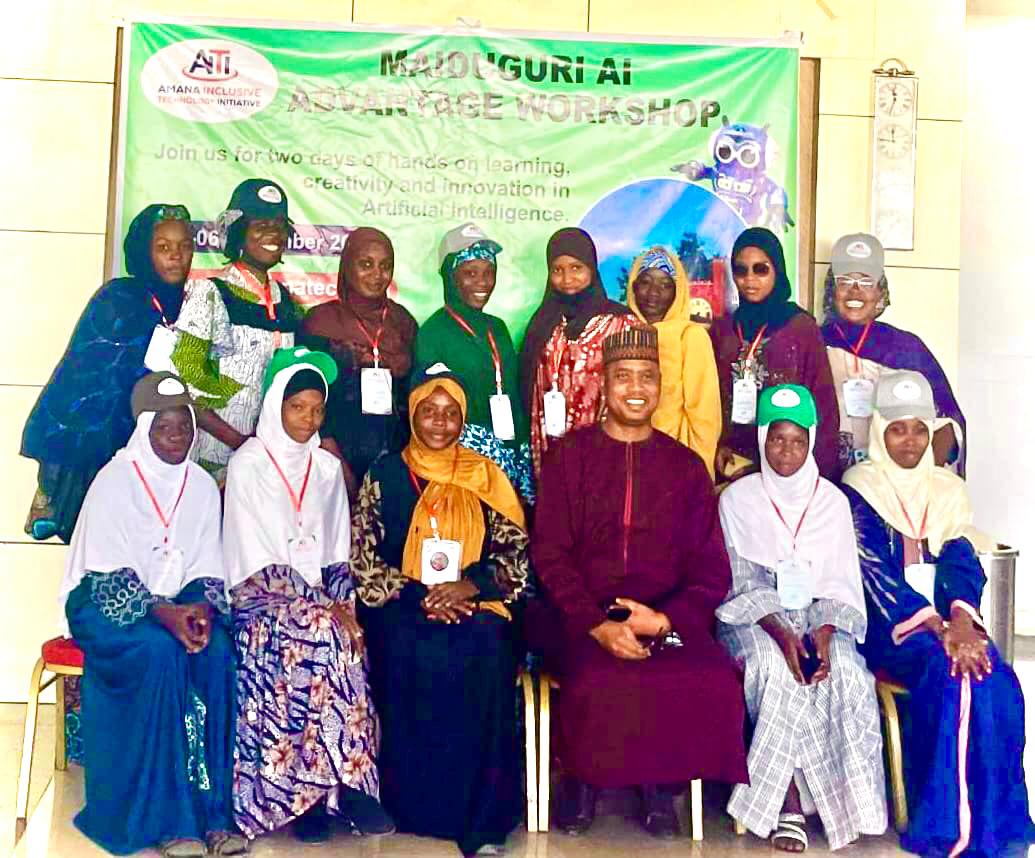BY FAIZA JIBRIN, NOVEMBER 08, 2025 | 02:08 PM
Many young people left the Amana Inclusive Technology Initiative’s recent workshop on Artificial Intelligence (AI) with a renewed sense of curiosity and confidence.
For them, the two-day training was more than just a class but an eye-opening experience that introduced them to a new world of digital knowledge.
‘Before coming here, I had very little knowledge about Artificial Intelligence but during the training, my eyes were opened.
‘I was taught how to use AI for good, and I learned things I never knew before.’ Barka Bulus Dibal a participant shared
‘I feel more enlightened now, and I can proudly say that I’m ready to explore AI, Python programming among others.’ He added
The workshop, organized by AITI, at the grand pinnacle Hotel, maiduguri brought together young people, students, and tech enthusiasts to learn the basics of Artificial Intelligence and Python, one of the world’s most widely used programming languages.
The non-profit organization is devoted to democratizing technology and ensuring that young people, especially in Africa, are not left behind in the rapidly changing digital world.
One of the facilitators, Fatima Yagana Abbas a front end developer handled the session on Python programming one of the most in-demand programming languages in the world.
Fatima lauded that the workshop was an introduction to give participants a clear idea of how it works.
‘Python is one of the most demanded programming languages today,’ she told the participants.
‘It is used in data analysis, gaming, and artificial intelligence. This workshop is only an introduction, but it gives you the foundation to continue learning on your own.’ She added
For many of the participants, the workshop was their first close encounter with Artificial Intelligence.
In line with AITI’s goal, the workshop was conducted using the Hausa local language, making it easier for participants to understand the complex ideas behind AI and Python programming.
This approach helped participants learn comfortably and freely ask questions in a language they fully understood.
‘Using Hausa made everything simple, it helped me understand what AI really means without feeling confused by big English terms.’ Laraba Jauro, also a participant said
In an interview with Jime Saleh, the Executive Director of AITI said the organization’s goal is to ensure that more people, especially those in developing regions, are not left behind in the fast moving world of artificial intelligence.
He compared AI to a fast-moving train that has already left many people behind.
‘AI is like a train moving fast, and millions of people are being left out,’ he said.
‘Our mission is to make sure everyone has a chance to learn and catch up.’ Jimeh added
While speaking he emphasized on the ethical use of AI, not just for profit, but for the good of our communities and called on local organizations and funders to support such initiatives.
He noted that AI literacy is key to future development and advised participants to share what they have learned with others.
Many participants described the experience as transformative the hands-on sessions made the lessons easier to understand.
At the end of the event, the hall was filled with appreciation and excitement as participants took group photos and exchanged contacts to continue learning together.
They also called for more of such trainings to help more young people become AI-literate.

